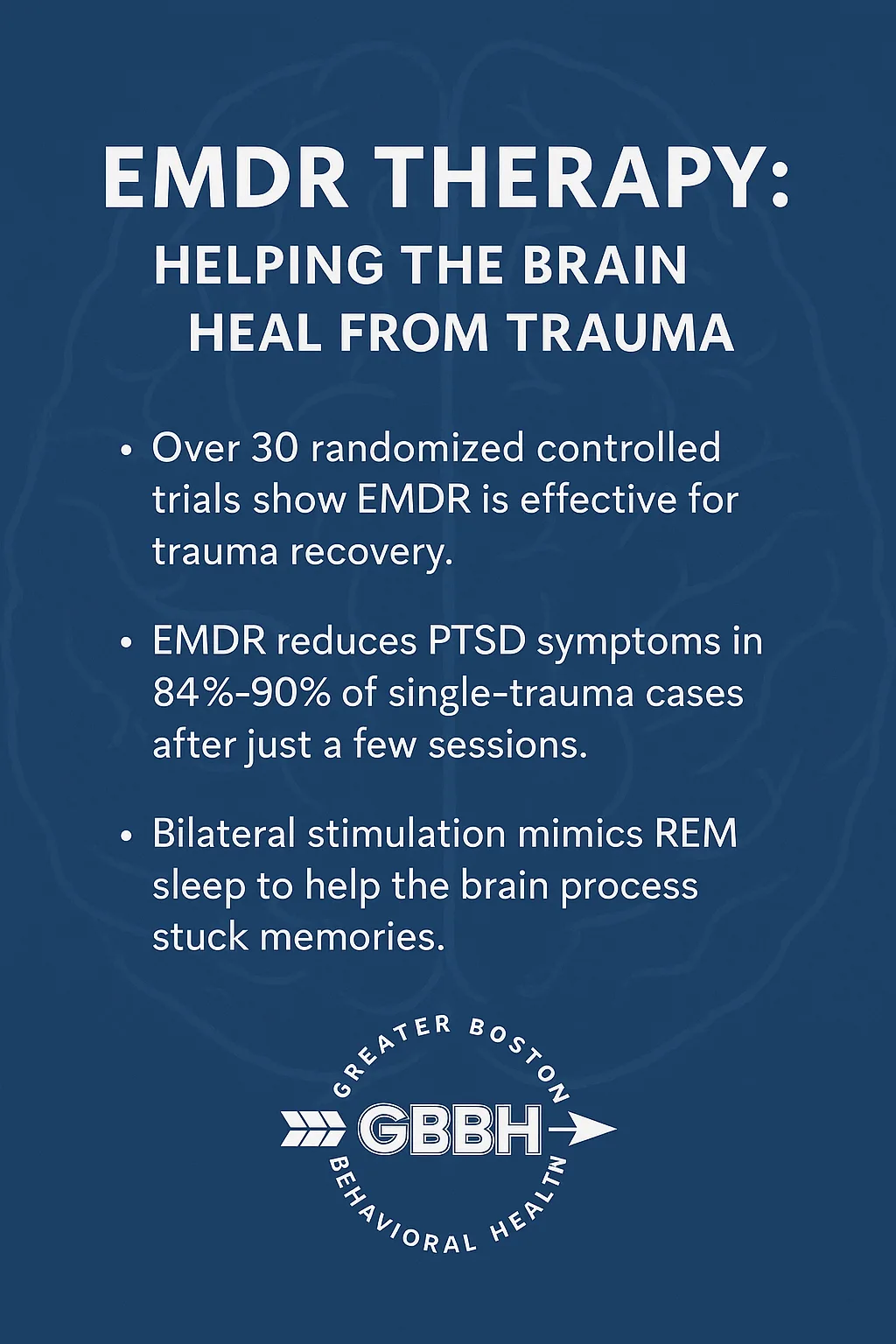As a parent, few things feel heavier than watching your child carry pain they can’t escape. When you’ve done everything you can—therapy appointments, encouragement, even treatment—and they’re still struggling, it’s easy to feel helpless. Maybe your young adult seems stuck, repeating the same destructive cycles. Maybe old trauma keeps resurfacing, no matter how much you both want to move forward.
EMDR therapy offers a different way through. It doesn’t ask your child to explain everything. It doesn’t demand that they “just move on.” It works directly with how the brain stores trauma—and helps it finally loosen its grip.
At Greater Boston Behavioral Health, we’ve seen EMDR therapy give families back their hope. It’s not a miracle cure. But it can be a powerful tool to help young adults feel safe inside their own minds again.
What Is EMDR Therapy?
EMDR stands for Eye Movement Desensitization and Reprocessing. It’s an evidence-based therapy developed to help people recover from trauma by changing the way the brain processes painful memories.
Unlike traditional talk therapy, EMDR doesn’t require reliving every painful detail. Instead, it uses a combination of:
- Targeted memory recall (brief and guided)
- Bilateral stimulation (like side-to-side eye movements or gentle tapping)
- Therapeutic reprocessing (where distressing memories are “filed away” properly)
Think of it as helping the brain “digest” experiences that were too overwhelming when they first happened. With EMDR, the emotional charge attached to traumatic memories softens, and many people report significant reductions in anxiety, flashbacks, and other symptoms.
How Trauma Gets Trapped in the Brain
During traumatic events, the brain’s natural processing system can become overwhelmed. This can cause memories to get stuck in raw, unprocessed forms. Instead of being stored as normal memories, they remain active—almost like your child’s brain is constantly on high alert.
These unprocessed memories can show up as:
- Nightmares or intrusive thoughts
- Panic attacks triggered by reminders
- Emotional numbness or disconnection
- Sudden bursts of anger or fear
EMDR therapy helps the brain process these memories, so they stop activating the fight-or-flight response. The memory doesn’t disappear, but the emotional sting fades. It’s like finally closing an open wound that’s been hurting for years.
What Happens in an EMDR Therapy Session?
One of the reasons EMDR is so effective is its structured approach. Every EMDR therapy session at Greater Boston Behavioral Health follows a gentle, supportive process tailored to each person’s readiness and needs.
1. History and Preparation:
Your child won’t be asked to dive into trauma on day one. The therapist spends time understanding their history and building a sense of safety. Coping skills are taught so that your child feels equipped to handle difficult emotions when they come up.
2. Identifying Targets:
Together with their therapist, your child will identify memories, situations, or feelings that feel stuck. Sometimes it’s a big traumatic event. Other times, it’s a lingering negative belief like “I’m not good enough.”
3. Bilateral Stimulation:
Using guided eye movements, tapping, or sounds, the therapist activates both sides of the brain while your child focuses briefly on the memory. This process mimics the natural memory-processing that happens during REM sleep.
4. Reprocessing:
As sessions progress, your child’s brain starts to connect the traumatic memory to healthier beliefs and reduced emotional responses. Many people describe feeling a “release” as difficult memories lose their painful edge.
5. Closure and Future Planning:
Each session ends with grounding techniques. EMDR therapy also focuses on strengthening positive beliefs about oneself—so healing isn’t just about reducing symptoms, but also about building resilience.
Why EMDR Therapy Helps Young Adults Heal
For young adults, especially those struggling with anxiety, depression, or the aftermath of substance use, trauma can be the hidden driver behind many challenges. EMDR therapy can be a turning point because it goes deeper than surface behaviors.
At Greater Boston Behavioral Health, we often see EMDR help with:
- Lessening anxiety that doesn’t respond to logic
- Reducing self-sabotaging behaviors linked to old wounds
- Breaking out of the fight-flight-freeze cycle
- Improving relationships by building internal safety
In areas like Needham, MA and Newton, MA, where families often feel pressure to succeed or “have it all together,” EMDR provides a compassionate, structured way to finally heal—not just cope.
Does EMDR Work for Everyone?
No single therapy is perfect for every person, but EMDR therapy has strong success rates, especially for trauma-related symptoms. Some young adults may benefit from combining EMDR with other therapies like cognitive-behavioral therapy (CBT), dialectical behavior therapy (DBT), or medication management.
A thorough assessment at Greater Boston Behavioral Health helps determine whether EMDR is a good fit for your child. Even if EMDR isn’t the right starting point, it can often be integrated later as part of a broader treatment plan.
How to Start EMDR Therapy in Boston
Starting EMDR therapy means finding a therapist who is not only trained but also experienced in trauma care. At Greater Boston Behavioral Health, our team specializes in trauma-focused care for young adults and their families.
Whether you’re looking for EMDR therapy in West Roxbury, MA, or in the heart of Boston, we’re here to help. We believe in offering therapy that respects your child’s pace while providing real tools for healing.
Frequently Asked Questions About EMDR Therapy
What age is EMDR therapy appropriate for?
EMDR can be adapted for children, teens, and adults. At Greater Boston Behavioral Health, we primarily use EMDR with young adults and adults, tailoring the process to their emotional readiness and maturity.
How many EMDR sessions will my child need?
It varies. Some people experience relief in as few as 6-12 sessions, while others benefit from longer-term therapy. Factors like the number of traumatic events, current life stressors, and individual readiness all play a role.
Does EMDR therapy bring up painful emotions?
Sometimes, yes—but EMDR is designed to help people process emotions safely, without becoming overwhelmed. Therapists teach coping strategies before starting and always check in during sessions to keep things manageable.
Is EMDR therapy covered by insurance?
Many insurance plans cover EMDR as part of outpatient mental health services. Our team can help you check your benefits and discuss options for care in Boston, MA.
Can EMDR be combined with other treatments?
Absolutely. EMDR often complements other therapies like DBT, CBT, or psychiatric care. It can be part of an intensive outpatient program (IOP) or individual therapy plan.
Reclaim Peace—for Them, and for You
You didn’t cause your child’s pain, and you can’t fix it alone. But you can connect them to resources that help their brain and body truly heal. EMDR therapy offers a gentle, scientifically grounded path to recovery that doesn’t depend on willpower or endless talk.
Call (888) 450-3097 or visit to learn more about our EMDR therapy services in Boston, Massachusetts.


